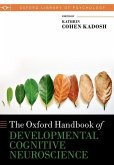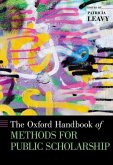Oxford Handbook of Spontaneous Thought
Mind-Wandering, Creativity, and Dreaming
Herausgeber: Fox, Kieran C R; Christoff, Kalina
Oxford Handbook of Spontaneous Thought
Mind-Wandering, Creativity, and Dreaming
Herausgeber: Fox, Kieran C R; Christoff, Kalina
- Gebundenes Buch
- Merkliste
- Auf die Merkliste
- Bewerten Bewerten
- Teilen
- Produkt teilen
- Produkterinnerung
- Produkterinnerung
This Handbook is the first of its kind to bring together views from neuroscience, psychology, philosophy, phenomenology, history, education, contemplative traditions, and clinical practice to explore the ubiquitous but poorly understood mental phenomena that we collectively call 'spontaneous thought,' including mind-wandering, daydreaming, insight, creative thinking, and dreaming.
Andere Kunden interessierten sich auch für
![Oxford Handbook of Causal Reasoning Oxford Handbook of Causal Reasoning]() Oxford Handbook of Causal Reasoning257,99 €
Oxford Handbook of Causal Reasoning257,99 €![The Oxford Handbook of Emotional Development The Oxford Handbook of Emotional Development]() The Oxford Handbook of Emotional Development183,99 €
The Oxford Handbook of Emotional Development183,99 €![Oxford Handbook of Sexual Conflict in Humans Oxford Handbook of Sexual Conflict in Humans]() Oxford Handbook of Sexual Conflict in Humans223,99 €
Oxford Handbook of Sexual Conflict in Humans223,99 €![The Oxford Handbook of Developmental Cognitive Neuroscience The Oxford Handbook of Developmental Cognitive Neuroscience]() The Oxford Handbook of Developmental Cognitive Neuroscience257,99 €
The Oxford Handbook of Developmental Cognitive Neuroscience257,99 €![The Oxford Handbook of Methods for Public Scholarship The Oxford Handbook of Methods for Public Scholarship]() The Oxford Handbook of Methods for Public Scholarship257,99 €
The Oxford Handbook of Methods for Public Scholarship257,99 €![Oxford Handbook of Personality and Social Psychology Oxford Handbook of Personality and Social Psychology]() Oxford Handbook of Personality and Social Psychology280,99 €
Oxford Handbook of Personality and Social Psychology280,99 €![The Oxford Handbook of Molecular Psychology The Oxford Handbook of Molecular Psychology]() Turhan CanliThe Oxford Handbook of Molecular Psychology202,99 €
Turhan CanliThe Oxford Handbook of Molecular Psychology202,99 €-
-
-
This Handbook is the first of its kind to bring together views from neuroscience, psychology, philosophy, phenomenology, history, education, contemplative traditions, and clinical practice to explore the ubiquitous but poorly understood mental phenomena that we collectively call 'spontaneous thought,' including mind-wandering, daydreaming, insight, creative thinking, and dreaming.
Hinweis: Dieser Artikel kann nur an eine deutsche Lieferadresse ausgeliefert werden.
Hinweis: Dieser Artikel kann nur an eine deutsche Lieferadresse ausgeliefert werden.
Produktdetails
- Produktdetails
- Verlag: Hurst & Co.
- Seitenzahl: 632
- Erscheinungstermin: 12. Juni 2018
- Englisch
- Abmessung: 261mm x 184mm x 40mm
- Gewicht: 1334g
- ISBN-13: 9780190464745
- ISBN-10: 0190464747
- Artikelnr.: 50905684
- Herstellerkennzeichnung
- Libri GmbH
- Europaallee 1
- 36244 Bad Hersfeld
- gpsr@libri.de
- Verlag: Hurst & Co.
- Seitenzahl: 632
- Erscheinungstermin: 12. Juni 2018
- Englisch
- Abmessung: 261mm x 184mm x 40mm
- Gewicht: 1334g
- ISBN-13: 9780190464745
- ISBN-10: 0190464747
- Artikelnr.: 50905684
- Herstellerkennzeichnung
- Libri GmbH
- Europaallee 1
- 36244 Bad Hersfeld
- gpsr@libri.de
Kieran C.R. Fox studied neuroscience, philosophy, and world religions during his undergraduate degree at McGill University. He used functional neuroimaging to study the cognitive neuroscience of meditation and spontaneous thought during his Masters and PhD at the University of British Columbia, working with Dr. Kalina Christoff. Currently, he is using intracranial electroencephalography to pursue these lines of research in the Department of Neurology at Stanford University, working with Dr. Josef Parvizi. Kalina Christoff is a Professor of Psychology at the University of British Columbia in Vancouver, Canada. Her work focuses on understanding human thought, using a combination of functional neuroimaging (fMRI), behavioral testing, and theoretical work.
* About the Editors
* Contributors
* Part I: Introduction and Overview
* 1. Introduction: Toward an Interdisciplinary Science of Spontaneous
Thought
* Kieran C. R. Fox and Kalina Christoff
* Part II: Theoretical Perspectives
* 2. Why the Mind Wanders: How Spontaneous Thought's Default
Variability May Support Episodic Efficiency and Semantic Optimization
* Caitlin Mills, Arianne Herrera-Bennett, Myrthe Faber, and Kalina
Christoff
* 3. An Exploration/Exploitation Tradeoff Between Mind-Wandering and
Goal-Directed Thinking
* Chandra S. Sripada
* 4. When the Absence of Reasoning Breeds Meaning: Metacognitive
Appraisals of Spontaneous Thought
* Carey K. Morewedge and Daniella M. Kupor
* 5. The Mind Wanders with Ease: Low Motivational Intensity is an
Essential Quality of Mind-Wandering
* Dylan Stan and Kalina Christoff
* 6. How does the brain's spontaneous activity generate our thoughts?
The spatiotemporal theory of task-unrelated thought (STTT)
* Georg Northoff
* 7. Investigating the elements of thought: Towards a component process
account of spontaneous Cognition
* Jonathan Smallwood, Daniel Margulies, Boris C. Bernhardt, and
Elizabeth Jeffries
* Part III: Philosophical, Evolutionary, and Historical Perspectives
* 8. The Philosophy of Mind-Wandering
* Zachary C. Irving and Evan Thompson
* 9. Why is mind wandering interesting for philosophers?
* Thomas Metzinger
* 10. Spontaneity in Evolution, Learning, Creativity, and Free Will:
Spontaneous Variation in Four Selectionist Phenomena
* Dean Keith Simonton
* 11. How Does the Waking and Sleeping Brain Produce Spontaneous
Thought and Imagery, and Why?
* John S. Antrobus
* 12. Spontaneous Thinking in Creative Lives: Building Connections
Between Science and History
* Alex Soojung-Kim Pang
* Part IV: Mind-Wandering and Daydreaming
* 13. Functional neuroanatomy of spontaneous thought
* Jessica R. Andrews-Hanna, Zachary C. Irving, Kieran C. R. Fox, R.
Nathan Spreng, and Kalina Christoff
* 14. Neural Origins of Self-Generated Cognition: Insights from
Intracranial Electrical Stimulation and Recordings in Humans
* Kieran C. R. Fox
* 15. Mind-wandering and self-referential thought
* Arnaud D'Argembeau
* 16. Phenomenological Properites of Mind-Wandering and Daydreaming: A
Historical Overview and Functional Correlates
* David Stawarczyk
* 17. Spontaneous thought and goal pursuit: From functions such as
planning to dysfunctions such as rumination
* Eric Klinger, Ernst H. W. Koster, and Igor Marchetti
* 18. Unraveling What's On Our Minds: How Different Types of
Mind-Wandering Affect Cognition and Behavior
* Claire M. Zedelius and Jonathan W. Schooler
* 19. Mind-wandering and events in the external world:
Electrophysiological evidence for attentional Decoupling
* Julia W. Y. Kam and Todd C. Handy
* 20. Mind-wandering in educational settings
* Jeffrey D. Wammes, Paul Seli, and Daniel Smilek
* Part V: Creativity and Insight
* 21. Interacting Brain Networks Underlying Creative Cognition and
Artistic Performance
* Roger E. Beaty and Rex E. Jung
* 22. Spontaneous and controlled processes in creative cognition
* Mathias Benedek and Emanuel Jauk
* 23. Wandering and Direction in Creative Production
* Charles Dobson
* 24. Flow as spontaneous thought: Insight and implicit learning
* John Vervaeke, Leo Ferraro, and Arianne Herrera-Bennett
* 25. Internal Orientation in Aesthetic Experience
* Oshin Vartanian
* 26. Neuropsychopharmacology of Flexible and Creative Thinking
* David Q. Beversdorf
* Part VI: Sleep, Dreaming, and Memory
* 27. Dreaming is an intensified form of mind-wandering, based in
augmented portions of the default network
* G. William Domhoff
* 28. Neural Correlates of Self-Generated Imagery and Cognition
Throughout the Sleep Cycle
* Kieran C. R. Fox and Manesh Girn
* 29. Spontaneous thought, insight, and control in lucid dreams
* Jennifer M. Windt and Ursula Voss
* 30. Microdream neurophenomenology: A paradigm for dream neuroscience
* Tore A. Nielsen
* 31. Sleep paralysis: Phenomenology, Neurophysiology, and Treatment
* Elizaveta Solomonova
* 32. Dreaming and Waking Thought as a Reflection of Memory
Consolidation
* Erin J. Wamsley
* 33. Involuntary Autobiographical Memories: Spontaneous Recollections
of the Past
* John H. Mace
* Part VII: Clinical Contexts, Contemplative Traditions, and Altered
States of Consciousness
* 34. Potential Clinical Benefits and Risks of Spontaneous Thought:
Unconstrained Attention as a Way Into and a Way Out of Psychological
Disharmony
* Dylan Stan and Kalina Christoff
* 35. Candidate Mechanisms of Spontaneous Cognition as Revealed By
Dementia Syndromes
* Claire O'Callaghan and Muireann Irish
* 36. Rumination is a Sticky Form of Spontaneous Thought
* Elizabeth DuPre and R. Nathan Spreng
* 37. Pain and Spontaneous Thought
* Aaron Kucyi
* 38. Spontaneous thought in contemplative traditions
* Halvor Eifring
* 39. Catching the Wandering Mind: Meditation as a Window into
Spontaneous Thought
* Wendy Hasenkamp
* 40. Spontaneous Mental Experiences in Extreme and Unusual
Environments
* Peter Suedfeld, A. Dennis Rank, and Marek Malu?s?
* 41. Cultural neurophenomenology of psychedelic thought: Guiding the
"unconstrained" mind through ritual and context
* Michael Lifshitz, Eli Sheiner, and Laurence Kirmayer
* Contributors
* Part I: Introduction and Overview
* 1. Introduction: Toward an Interdisciplinary Science of Spontaneous
Thought
* Kieran C. R. Fox and Kalina Christoff
* Part II: Theoretical Perspectives
* 2. Why the Mind Wanders: How Spontaneous Thought's Default
Variability May Support Episodic Efficiency and Semantic Optimization
* Caitlin Mills, Arianne Herrera-Bennett, Myrthe Faber, and Kalina
Christoff
* 3. An Exploration/Exploitation Tradeoff Between Mind-Wandering and
Goal-Directed Thinking
* Chandra S. Sripada
* 4. When the Absence of Reasoning Breeds Meaning: Metacognitive
Appraisals of Spontaneous Thought
* Carey K. Morewedge and Daniella M. Kupor
* 5. The Mind Wanders with Ease: Low Motivational Intensity is an
Essential Quality of Mind-Wandering
* Dylan Stan and Kalina Christoff
* 6. How does the brain's spontaneous activity generate our thoughts?
The spatiotemporal theory of task-unrelated thought (STTT)
* Georg Northoff
* 7. Investigating the elements of thought: Towards a component process
account of spontaneous Cognition
* Jonathan Smallwood, Daniel Margulies, Boris C. Bernhardt, and
Elizabeth Jeffries
* Part III: Philosophical, Evolutionary, and Historical Perspectives
* 8. The Philosophy of Mind-Wandering
* Zachary C. Irving and Evan Thompson
* 9. Why is mind wandering interesting for philosophers?
* Thomas Metzinger
* 10. Spontaneity in Evolution, Learning, Creativity, and Free Will:
Spontaneous Variation in Four Selectionist Phenomena
* Dean Keith Simonton
* 11. How Does the Waking and Sleeping Brain Produce Spontaneous
Thought and Imagery, and Why?
* John S. Antrobus
* 12. Spontaneous Thinking in Creative Lives: Building Connections
Between Science and History
* Alex Soojung-Kim Pang
* Part IV: Mind-Wandering and Daydreaming
* 13. Functional neuroanatomy of spontaneous thought
* Jessica R. Andrews-Hanna, Zachary C. Irving, Kieran C. R. Fox, R.
Nathan Spreng, and Kalina Christoff
* 14. Neural Origins of Self-Generated Cognition: Insights from
Intracranial Electrical Stimulation and Recordings in Humans
* Kieran C. R. Fox
* 15. Mind-wandering and self-referential thought
* Arnaud D'Argembeau
* 16. Phenomenological Properites of Mind-Wandering and Daydreaming: A
Historical Overview and Functional Correlates
* David Stawarczyk
* 17. Spontaneous thought and goal pursuit: From functions such as
planning to dysfunctions such as rumination
* Eric Klinger, Ernst H. W. Koster, and Igor Marchetti
* 18. Unraveling What's On Our Minds: How Different Types of
Mind-Wandering Affect Cognition and Behavior
* Claire M. Zedelius and Jonathan W. Schooler
* 19. Mind-wandering and events in the external world:
Electrophysiological evidence for attentional Decoupling
* Julia W. Y. Kam and Todd C. Handy
* 20. Mind-wandering in educational settings
* Jeffrey D. Wammes, Paul Seli, and Daniel Smilek
* Part V: Creativity and Insight
* 21. Interacting Brain Networks Underlying Creative Cognition and
Artistic Performance
* Roger E. Beaty and Rex E. Jung
* 22. Spontaneous and controlled processes in creative cognition
* Mathias Benedek and Emanuel Jauk
* 23. Wandering and Direction in Creative Production
* Charles Dobson
* 24. Flow as spontaneous thought: Insight and implicit learning
* John Vervaeke, Leo Ferraro, and Arianne Herrera-Bennett
* 25. Internal Orientation in Aesthetic Experience
* Oshin Vartanian
* 26. Neuropsychopharmacology of Flexible and Creative Thinking
* David Q. Beversdorf
* Part VI: Sleep, Dreaming, and Memory
* 27. Dreaming is an intensified form of mind-wandering, based in
augmented portions of the default network
* G. William Domhoff
* 28. Neural Correlates of Self-Generated Imagery and Cognition
Throughout the Sleep Cycle
* Kieran C. R. Fox and Manesh Girn
* 29. Spontaneous thought, insight, and control in lucid dreams
* Jennifer M. Windt and Ursula Voss
* 30. Microdream neurophenomenology: A paradigm for dream neuroscience
* Tore A. Nielsen
* 31. Sleep paralysis: Phenomenology, Neurophysiology, and Treatment
* Elizaveta Solomonova
* 32. Dreaming and Waking Thought as a Reflection of Memory
Consolidation
* Erin J. Wamsley
* 33. Involuntary Autobiographical Memories: Spontaneous Recollections
of the Past
* John H. Mace
* Part VII: Clinical Contexts, Contemplative Traditions, and Altered
States of Consciousness
* 34. Potential Clinical Benefits and Risks of Spontaneous Thought:
Unconstrained Attention as a Way Into and a Way Out of Psychological
Disharmony
* Dylan Stan and Kalina Christoff
* 35. Candidate Mechanisms of Spontaneous Cognition as Revealed By
Dementia Syndromes
* Claire O'Callaghan and Muireann Irish
* 36. Rumination is a Sticky Form of Spontaneous Thought
* Elizabeth DuPre and R. Nathan Spreng
* 37. Pain and Spontaneous Thought
* Aaron Kucyi
* 38. Spontaneous thought in contemplative traditions
* Halvor Eifring
* 39. Catching the Wandering Mind: Meditation as a Window into
Spontaneous Thought
* Wendy Hasenkamp
* 40. Spontaneous Mental Experiences in Extreme and Unusual
Environments
* Peter Suedfeld, A. Dennis Rank, and Marek Malu?s?
* 41. Cultural neurophenomenology of psychedelic thought: Guiding the
"unconstrained" mind through ritual and context
* Michael Lifshitz, Eli Sheiner, and Laurence Kirmayer
* About the Editors
* Contributors
* Part I: Introduction and Overview
* 1. Introduction: Toward an Interdisciplinary Science of Spontaneous
Thought
* Kieran C. R. Fox and Kalina Christoff
* Part II: Theoretical Perspectives
* 2. Why the Mind Wanders: How Spontaneous Thought's Default
Variability May Support Episodic Efficiency and Semantic Optimization
* Caitlin Mills, Arianne Herrera-Bennett, Myrthe Faber, and Kalina
Christoff
* 3. An Exploration/Exploitation Tradeoff Between Mind-Wandering and
Goal-Directed Thinking
* Chandra S. Sripada
* 4. When the Absence of Reasoning Breeds Meaning: Metacognitive
Appraisals of Spontaneous Thought
* Carey K. Morewedge and Daniella M. Kupor
* 5. The Mind Wanders with Ease: Low Motivational Intensity is an
Essential Quality of Mind-Wandering
* Dylan Stan and Kalina Christoff
* 6. How does the brain's spontaneous activity generate our thoughts?
The spatiotemporal theory of task-unrelated thought (STTT)
* Georg Northoff
* 7. Investigating the elements of thought: Towards a component process
account of spontaneous Cognition
* Jonathan Smallwood, Daniel Margulies, Boris C. Bernhardt, and
Elizabeth Jeffries
* Part III: Philosophical, Evolutionary, and Historical Perspectives
* 8. The Philosophy of Mind-Wandering
* Zachary C. Irving and Evan Thompson
* 9. Why is mind wandering interesting for philosophers?
* Thomas Metzinger
* 10. Spontaneity in Evolution, Learning, Creativity, and Free Will:
Spontaneous Variation in Four Selectionist Phenomena
* Dean Keith Simonton
* 11. How Does the Waking and Sleeping Brain Produce Spontaneous
Thought and Imagery, and Why?
* John S. Antrobus
* 12. Spontaneous Thinking in Creative Lives: Building Connections
Between Science and History
* Alex Soojung-Kim Pang
* Part IV: Mind-Wandering and Daydreaming
* 13. Functional neuroanatomy of spontaneous thought
* Jessica R. Andrews-Hanna, Zachary C. Irving, Kieran C. R. Fox, R.
Nathan Spreng, and Kalina Christoff
* 14. Neural Origins of Self-Generated Cognition: Insights from
Intracranial Electrical Stimulation and Recordings in Humans
* Kieran C. R. Fox
* 15. Mind-wandering and self-referential thought
* Arnaud D'Argembeau
* 16. Phenomenological Properites of Mind-Wandering and Daydreaming: A
Historical Overview and Functional Correlates
* David Stawarczyk
* 17. Spontaneous thought and goal pursuit: From functions such as
planning to dysfunctions such as rumination
* Eric Klinger, Ernst H. W. Koster, and Igor Marchetti
* 18. Unraveling What's On Our Minds: How Different Types of
Mind-Wandering Affect Cognition and Behavior
* Claire M. Zedelius and Jonathan W. Schooler
* 19. Mind-wandering and events in the external world:
Electrophysiological evidence for attentional Decoupling
* Julia W. Y. Kam and Todd C. Handy
* 20. Mind-wandering in educational settings
* Jeffrey D. Wammes, Paul Seli, and Daniel Smilek
* Part V: Creativity and Insight
* 21. Interacting Brain Networks Underlying Creative Cognition and
Artistic Performance
* Roger E. Beaty and Rex E. Jung
* 22. Spontaneous and controlled processes in creative cognition
* Mathias Benedek and Emanuel Jauk
* 23. Wandering and Direction in Creative Production
* Charles Dobson
* 24. Flow as spontaneous thought: Insight and implicit learning
* John Vervaeke, Leo Ferraro, and Arianne Herrera-Bennett
* 25. Internal Orientation in Aesthetic Experience
* Oshin Vartanian
* 26. Neuropsychopharmacology of Flexible and Creative Thinking
* David Q. Beversdorf
* Part VI: Sleep, Dreaming, and Memory
* 27. Dreaming is an intensified form of mind-wandering, based in
augmented portions of the default network
* G. William Domhoff
* 28. Neural Correlates of Self-Generated Imagery and Cognition
Throughout the Sleep Cycle
* Kieran C. R. Fox and Manesh Girn
* 29. Spontaneous thought, insight, and control in lucid dreams
* Jennifer M. Windt and Ursula Voss
* 30. Microdream neurophenomenology: A paradigm for dream neuroscience
* Tore A. Nielsen
* 31. Sleep paralysis: Phenomenology, Neurophysiology, and Treatment
* Elizaveta Solomonova
* 32. Dreaming and Waking Thought as a Reflection of Memory
Consolidation
* Erin J. Wamsley
* 33. Involuntary Autobiographical Memories: Spontaneous Recollections
of the Past
* John H. Mace
* Part VII: Clinical Contexts, Contemplative Traditions, and Altered
States of Consciousness
* 34. Potential Clinical Benefits and Risks of Spontaneous Thought:
Unconstrained Attention as a Way Into and a Way Out of Psychological
Disharmony
* Dylan Stan and Kalina Christoff
* 35. Candidate Mechanisms of Spontaneous Cognition as Revealed By
Dementia Syndromes
* Claire O'Callaghan and Muireann Irish
* 36. Rumination is a Sticky Form of Spontaneous Thought
* Elizabeth DuPre and R. Nathan Spreng
* 37. Pain and Spontaneous Thought
* Aaron Kucyi
* 38. Spontaneous thought in contemplative traditions
* Halvor Eifring
* 39. Catching the Wandering Mind: Meditation as a Window into
Spontaneous Thought
* Wendy Hasenkamp
* 40. Spontaneous Mental Experiences in Extreme and Unusual
Environments
* Peter Suedfeld, A. Dennis Rank, and Marek Malu?s?
* 41. Cultural neurophenomenology of psychedelic thought: Guiding the
"unconstrained" mind through ritual and context
* Michael Lifshitz, Eli Sheiner, and Laurence Kirmayer
* Contributors
* Part I: Introduction and Overview
* 1. Introduction: Toward an Interdisciplinary Science of Spontaneous
Thought
* Kieran C. R. Fox and Kalina Christoff
* Part II: Theoretical Perspectives
* 2. Why the Mind Wanders: How Spontaneous Thought's Default
Variability May Support Episodic Efficiency and Semantic Optimization
* Caitlin Mills, Arianne Herrera-Bennett, Myrthe Faber, and Kalina
Christoff
* 3. An Exploration/Exploitation Tradeoff Between Mind-Wandering and
Goal-Directed Thinking
* Chandra S. Sripada
* 4. When the Absence of Reasoning Breeds Meaning: Metacognitive
Appraisals of Spontaneous Thought
* Carey K. Morewedge and Daniella M. Kupor
* 5. The Mind Wanders with Ease: Low Motivational Intensity is an
Essential Quality of Mind-Wandering
* Dylan Stan and Kalina Christoff
* 6. How does the brain's spontaneous activity generate our thoughts?
The spatiotemporal theory of task-unrelated thought (STTT)
* Georg Northoff
* 7. Investigating the elements of thought: Towards a component process
account of spontaneous Cognition
* Jonathan Smallwood, Daniel Margulies, Boris C. Bernhardt, and
Elizabeth Jeffries
* Part III: Philosophical, Evolutionary, and Historical Perspectives
* 8. The Philosophy of Mind-Wandering
* Zachary C. Irving and Evan Thompson
* 9. Why is mind wandering interesting for philosophers?
* Thomas Metzinger
* 10. Spontaneity in Evolution, Learning, Creativity, and Free Will:
Spontaneous Variation in Four Selectionist Phenomena
* Dean Keith Simonton
* 11. How Does the Waking and Sleeping Brain Produce Spontaneous
Thought and Imagery, and Why?
* John S. Antrobus
* 12. Spontaneous Thinking in Creative Lives: Building Connections
Between Science and History
* Alex Soojung-Kim Pang
* Part IV: Mind-Wandering and Daydreaming
* 13. Functional neuroanatomy of spontaneous thought
* Jessica R. Andrews-Hanna, Zachary C. Irving, Kieran C. R. Fox, R.
Nathan Spreng, and Kalina Christoff
* 14. Neural Origins of Self-Generated Cognition: Insights from
Intracranial Electrical Stimulation and Recordings in Humans
* Kieran C. R. Fox
* 15. Mind-wandering and self-referential thought
* Arnaud D'Argembeau
* 16. Phenomenological Properites of Mind-Wandering and Daydreaming: A
Historical Overview and Functional Correlates
* David Stawarczyk
* 17. Spontaneous thought and goal pursuit: From functions such as
planning to dysfunctions such as rumination
* Eric Klinger, Ernst H. W. Koster, and Igor Marchetti
* 18. Unraveling What's On Our Minds: How Different Types of
Mind-Wandering Affect Cognition and Behavior
* Claire M. Zedelius and Jonathan W. Schooler
* 19. Mind-wandering and events in the external world:
Electrophysiological evidence for attentional Decoupling
* Julia W. Y. Kam and Todd C. Handy
* 20. Mind-wandering in educational settings
* Jeffrey D. Wammes, Paul Seli, and Daniel Smilek
* Part V: Creativity and Insight
* 21. Interacting Brain Networks Underlying Creative Cognition and
Artistic Performance
* Roger E. Beaty and Rex E. Jung
* 22. Spontaneous and controlled processes in creative cognition
* Mathias Benedek and Emanuel Jauk
* 23. Wandering and Direction in Creative Production
* Charles Dobson
* 24. Flow as spontaneous thought: Insight and implicit learning
* John Vervaeke, Leo Ferraro, and Arianne Herrera-Bennett
* 25. Internal Orientation in Aesthetic Experience
* Oshin Vartanian
* 26. Neuropsychopharmacology of Flexible and Creative Thinking
* David Q. Beversdorf
* Part VI: Sleep, Dreaming, and Memory
* 27. Dreaming is an intensified form of mind-wandering, based in
augmented portions of the default network
* G. William Domhoff
* 28. Neural Correlates of Self-Generated Imagery and Cognition
Throughout the Sleep Cycle
* Kieran C. R. Fox and Manesh Girn
* 29. Spontaneous thought, insight, and control in lucid dreams
* Jennifer M. Windt and Ursula Voss
* 30. Microdream neurophenomenology: A paradigm for dream neuroscience
* Tore A. Nielsen
* 31. Sleep paralysis: Phenomenology, Neurophysiology, and Treatment
* Elizaveta Solomonova
* 32. Dreaming and Waking Thought as a Reflection of Memory
Consolidation
* Erin J. Wamsley
* 33. Involuntary Autobiographical Memories: Spontaneous Recollections
of the Past
* John H. Mace
* Part VII: Clinical Contexts, Contemplative Traditions, and Altered
States of Consciousness
* 34. Potential Clinical Benefits and Risks of Spontaneous Thought:
Unconstrained Attention as a Way Into and a Way Out of Psychological
Disharmony
* Dylan Stan and Kalina Christoff
* 35. Candidate Mechanisms of Spontaneous Cognition as Revealed By
Dementia Syndromes
* Claire O'Callaghan and Muireann Irish
* 36. Rumination is a Sticky Form of Spontaneous Thought
* Elizabeth DuPre and R. Nathan Spreng
* 37. Pain and Spontaneous Thought
* Aaron Kucyi
* 38. Spontaneous thought in contemplative traditions
* Halvor Eifring
* 39. Catching the Wandering Mind: Meditation as a Window into
Spontaneous Thought
* Wendy Hasenkamp
* 40. Spontaneous Mental Experiences in Extreme and Unusual
Environments
* Peter Suedfeld, A. Dennis Rank, and Marek Malu?s?
* 41. Cultural neurophenomenology of psychedelic thought: Guiding the
"unconstrained" mind through ritual and context
* Michael Lifshitz, Eli Sheiner, and Laurence Kirmayer








